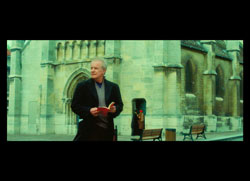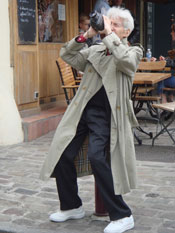There is nothing clear or particularly direct about Wild Grass, save that it’s obviously the work of a true artist. This is a movie that could not have been made by committee or a visionless hired hand. It’s too wacky. Plus, the mastery of beautiful color, image, sound—and the confident audacity with which it is all employed in the service of story—bear the clear marks of a great director with intense vision. But even great directors make severe missteps.
Wild Grass is the latest picture from the veteran Alain Resnais, 88, one of contemporary cinema’s most treasured artists. A member of the group of filmmakers in the 1960s who pioneered the French New Wave (a crucial film movement in the history of the medium), Resnais was behind such psychological masterpieces as Night and Fog (1955), Hiroshima Mon Amour (1959), and Last Year at Marienbad (1961). More than half a century after those great films, Resnais is still churning out new, challenging work. But his latest, Wild Grass—though technically expert and full of refined craft—never quite comes together in any sort of satisfying way.
Based on the novel L’incident by French novelist Christian Gailly, Wild Grass has a simple enough story: A middle-aged woman named Marguerite (Sabine Azema) loses her wallet, which is found by a middle-aged man, Georges (Andrew Dussollier). Georges returns the wallet to the local police station where Marguerite eventually picks it up. During this process, both Georges and Marguerite become curious about the other person, and wonder whether the incident of the lost and found wallet might be fate trying to bring them together.

Though described as a story about “giving and acknowledging thanks,” Wild Grass mostly ends up being a loopy, dream-like, extremely French ode to “my life to live” existentialism. It’s about what would happen if two middle-aged people—both relatively stable and successful—decided to suddenly upturn their lives in the name of seizing the day and embracing the opportunities of life. Oh, and it also has something to do with the metaphor of wild grass—of people who follow totally unreasonable impulses “like those seeds that make the most of cracks in the asphalt and grow where they are least expected to.”
Georges and Marguerite have no real excuse for their crazy, impulse-fueled dive into the sort of reckless behavior that will likely be their undoing (and indeed, is). George has a beautiful house with blue trim, a gorgeous and kind wife (Anne Consigny), and two lovely adult children. Marguerite is a wealthy dentist with an awesome apartment, some truly wild red hair, and a sweet yellow sportscar. Did you notice all the colors? That’s because these characters inhabit worlds that are dripping with sumptuous colors and environments with inviting textures and vitality. Who would be unsatisfied in such a world?

Perhaps the characters are frustrated and “looking for more” because all the beauty, art, and thrill of their everyday experiences don’t add up to anything that ultimately connects. It’s all just fragments. There’s no overarching meaning or purpose—so of course when a wallet brings a bit of fateful (or random) mystery into their lives, it’s embraced with headlong passion. But meaning is not found.
Which is why the movie itself doesn’t work. It’s a great assemblage of beautiful and interesting things—exquisite, colorful cinematography by Eric Gautier, cheerfully retro/jazzy music by Mark Snow, intriguing performances by excellent actors, etc. But at the end of the day, it’s all just window dressing for a house with nothing inside. By the end of the film, the shocking-on-paper conclusion hardly registers on the “wow” scale, because by that point nothing seems farfetched, and we don’t care about the characters anyway.

I suppose the point of Wild Grass—if there is a point—is to suggest that life isn’t really worth living if it isn’t lived with desire and passion and spontaneity. Even when you’re old, you can and should do whatever brings you pleasure and thrill! But this is a tired point that has been made before, many times. It’s the point that essentially fueled the French New Wave and inspired countless existentialist films, books, poems, and movements. And it’s a point that is so bound to a particular cultural disposition—western, wealthy, usually white and bored—that it’s hard to even take seriously as anything other than superfluous bourgeois ridiculousness.
Movies like Wild Grass would have been revolutionary in 1960—back when Resnais really was revolutionizing cinema. But today its meandering, oddball, dissonant style just feels annoying and retread, and its story and themes about “living life to the fullest” are pretty ho-hum. We’ve seen it a million times before: Husband in a happy marriage meets mysterious redhead woman who causes him to abandon everything for the sake of feeling life in his veins again. Boring. It’d really be exciting if, for once, a film expressed “living life to the fullest” in terms of sticking to commitments, saying no to temptations, and recognizing the joy in restraint. I think the world would benefit from more stories like that.
Talk About It
Discussion starters- What motivates Georges and Marguerite’s curiosity about one another? Why do they form the bond that they do?
- What point do you think is being made with the way the film ends? And what do you make about the “false end”?
- Do you think life is necessarily joyless if it resists opportunities to pursue mysterious relationships if they arise? Would Georges have been better off if he hadn’t tried to contact Marguerite?
The Family Corner
Wild Grass is rated PG for some thematic material, language and brief smoking. It’s remarkably innocuous for a film of its type (arthouse). But it’s not a film that would be of any interest to children and young adults.
Photos © Sony Pictures Classics.
Copyright © 2010 Christianity Today. Click for reprint information.











